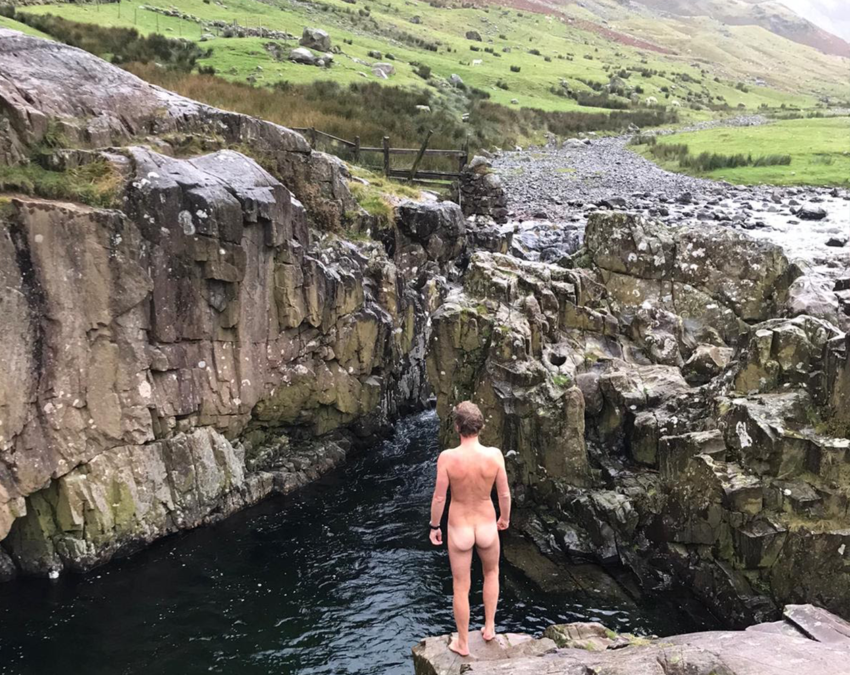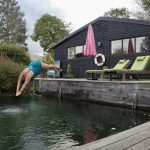The innocent truth of skinny dipping
Is skinny dipping legal in the UK – and where can you do it?
Despite it being lawful in the UK to be naked in public, the legality surrounding skinny dipping has not always been clear. In the early 2000s, British Naturism, the national representative body for naturism in the UK, supported the government as it looked to update legislation on public nudity. That process resulted in the 2003 Sexual Offences Act, in which naturism was specifically excluded. However, since then there have still been incidents and arrests for people partaking in public nudity, including skinny dipping.
In 2014, two men were threatened with a criminal record and being put on the sex offenders register for swimming naked on a beach in Northern Ireland. Both were later released without charge once the innocence of their actions became clear, yet it said a great deal about society’s attitudes towards public nudity.
Andrew Welch, a spokesperson for British Naturism and editor of the British Naturism magazine, believes that the police and authorities are beginning to understand the rules regarding public nudity, but have often “pandered to what they believe the culture is”. He suggests that the non-acceptance in society of nudity stems from the Victorian era and the height of the British Empire.
“At that time, people would dress for dinner and make themselves as uncomfortable as possible to make the right impression. As the British Empire, we wanted to be seen to be doing the right things,” he says. “But the more we covered ourselves up, it opened up that other desire: the want to know what is covered away. It promoted mystery and curiosity – which can unfortunately completely go the wrong way.”
Andrew believes that as a society we are gradually moving away from these Victorian attitudes. “What we are finding now in the third decade of the 21st century is that we are a bit more grown up, and that there are more wild and wacky things for people to do. The idea of people sitting on a beach naked just isn’t the eyebrow raising, dinner party subject that it might have been twenty years ago. In fact, most people have probably skinny dipped. It does not have the shock that it perhaps used to.”
Nick Mayhew-Smith, a naturist, journalist and author of books on wild swimming, believes that the most transgressive thing about skinny-dipping isn’t the nudity – it’s the swimming. “People do come up to me when I’m skinny-dipping, but they almost always just ask about the swimming,” he says. “It’s the thing people are really curious to when they see someone in a river.
“I get the impression that for a lot of people, they are actually quite sympathetic to skinny dipping. I think it’s almost a universal human instinct to get into the water. I know anecdotally if I mention naturism to people, they almost always have a skinny dipping story.”
Nick has extensively studied and authored books on wild swimming and skinny dipping, as well as a PhD on sacred bathing traditions in medieval Britain. Through this research, he has found that swimming in bathing costumes is actually a relatively new concept.
“Since antiquity, since the earliest portrayals of people swimming, people have done it with nothing on,” he says. “It is only in the last maybe 140 years that swimming was hoovered up from the landscape and kind of institutionalised and put into a building. I think that’s gone hand-in-hand with the sudden appearance of swimming costumes as a thing.”
As one of an estimated four million naturists living in the UK, Nick says he has no particular reason or need to get dressed, having hardly ever worn a swimming costume in his life.
“I think that justifying swimming with nothing on, if you look at it over a very long period of human history, it doesn’t need to be explained,” he says. “It’s there, it’s how everybody always swam. It is the only communal human activity that’s unchanged in every detail since the dawn of history. It’s primal.”
British Naturism host the Great British Skinny Dip annually
Nature affirming
It is this idea – that skinny dipping is the most natural way for humans to swim – that for many people, swimming naked is a way for them to be close to and more at one with nature.
“There is a kind of innocence and vulnerability to it,” Nick says. “You feel raw and exposed and kind of part of the landscape when you swim with nothing on – a sort of participant in it in a way. I think it shows a certain kind of sympathy with the wilderness – the lack of civilisation and human constraints and restrictions.”
This philosophy is echoed by Kate Uwins, skinny dipper and co-author of Newd Zealand, a skinny-dipping guide to New Zealand’s South Island.
Growing up in the countryside in Surrey, Kate always loved nature, but admits she felt more of an observer to it than a participator. It was only when she ditched her swimming costume and “took away the man-made thing that was standing between her and the water”, that she felt part of the natural world around her.
“For me, skinny dipping has been such a huge way to connect with nature,” she says. “When you skinny dip, you are completely immersed in nature. You are in your most natural form, completely as you were made.
“I believe it is really important that we go back a little bit to our almost primal roots, and remember where we come from, and realise what is natural for humans and not push ourselves to always be so busy with technology and being indoors.”
Kate believes that skinny-dipping is “the perfect remedy” to being stuck indoors for all this time during lockdown and something that people need in their lives now more than ever.
“What could be more liberating post-lockdown than taking all your clothes off and jumping in a river! I think it is what people need for sure,” she says.

Black Moss Pot, Keswick
Body confidence
Despite the anecdotal evidence that skinny dipping brings you closer to nature, being naked in public, for many people, is still a frightening idea.
According to a study undertaken last year by the Mental Health Association, over a third of UK adults said they have felt anxious or depressed because of concerns about their body image. They also found that one of the key causes of body image concerns is the pressure to look a certain way and to match an ideal body type.
Kate feels strongly that social and individual nudity in nature can help with people’s body confidence. “We all try to look good, to do our hair and makeup and clothes to keep up appearances,” she says, “but once you’re naked, you can strip all that away and just be yourself. And when you do it with a group of people, you realise that it doesn’t really matter what you look like.”
As a naturist, Nick has similar thoughts on group nudity. He has found that when he spends time with other people naked, he ends up feeling quite benign towards the human body. “It’s a very equal, egalitarian, accepting, tolerant, open thing to do,” he says. “You see people without that kind of facade and persona that we put on around us when we build an image of ourselves.
“You are able talk to people without any trappings, without any need to holdback or be constrained by the usual concerns we have about a body. I think on a deep level, it just shows a kind of acceptance, tolerance and common humanity, if you like.”
The positive impact that social nudity has on the way people perceive their own bodies has been well documented. A 2017 study undertaken by Goldsmiths, University of London, found that out of 850 British people surveyed – of a variety of ages, ethnicities and religions – those who spent time naked or partially naked around others also liked their own bodies more, thought better of themselves, and were more satisfied with their lives overall.
There is now a movement in the UK to introduce more people to the benefits of skinny dipping and social nudity.
How to skinny dip
British Naturism host the Great British Skinny Dip every year to try and introduce more people to the benefits of nudity, whether that is with a group of others or a skinny dip by yourself. The event is held all across the country and more information can be found on their website: www.bn.org.uk.
Outside of specific skinny dipping events, it is easier as it sounds – particularly if you are already an outdoor swimmer. Anywhere that you can legally swim, you can skinny dip. It really is that simple.
Is it legal – and where can you do it?
The Sexual Offences Act of 2003 specifically excludes Naturism – meaning that it is perfectly legal to take your clothes off in public. This is on the basis, though, that it is not done with the intent of causing “alarm or distress” to others. If you do, then it could be a
criminal offence.
The UK is blessed with spots for wild swimming. Anywhere that you can legally swim, where you are not trespassing and adhere to laws on public nudity, technically you can skinny dip there. Bare Britain written by Nick Mayhew-Smith and Mike Charles offers an insight into the world of skinny dipping and features 50 beaches to visit in the UK.
Or search for wild swimming and skinny dipping groups on social media for suggestions on some of the best spots to go swimming in your local area.
Visit bn.org.uk too for more information on skinny dipping and naturism groups and events.







